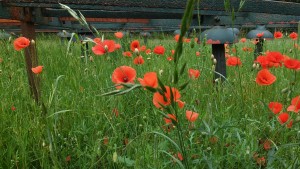Paschalena Mavrou has recently begun the Doctoral Practitioner in Sustainability program in CES. Here she reflects on her experience so far:
I am your typical engineer. For me every term has a single definition and every problem has a solution to which usually a single correct method will lead you. Well, at least that was how I thought before joining the first cohort of the Doctoral Practitioners for Sustainability programme of the Centre for Environmental Strategy in the University of Surrey. Now after a summer of learning about sustainability and its many definitions I try to keep an open mind.
First day in and I found everything overwhelming. The change of country, work environment, people and spoken language! Walking into the classroom that was going to be my home for the next two months I was initially disheartened by the small size of the group. Don’t get me started on the projects. Behaviour change, supply chains and people management. What was I doing among them and what kind of disciplines were those? At the time it appeared that I had nothing in common with the other students. All I kept thinking was that I was going to spend my much anticipated summer inside a classroom with some strangers learning from engineers that had strayed to the dark side: the environmental side. Who would have known that it would have been one of the most interesting summers of my life.
Next week the modules were due to begin. We started with life cycle thinking and the circular economy. A brand new world for me. We watched a lot of lectures that were part of the CES Master’s programme on Sustainable Development. But the lectures were not just from people in academia. Sustainability experts from international companies presented how they applied life cycle thinking in their day to day operations. That was interesting. So I wasn’t just being taught something theoretical, I was learning something that was actually being applied in the real world. But as the topic was completely new to me I obviously had questions. Usually I just shied away and asked nothing but here the intimate teaching environment, the encouragement from Dr. Jaqi Lee and Prof. Chris France who were running the modules and even the fact that my sustainability experienced fellow students had questions made me start asking questions myself. And I didn’t stop! Sometimes the answers we got triggered more questions or even lengthy discussions. Who would have known that one day I would be part of discussions about sustainability related topics!
After the end of the first module class was over for a little while. But that didn’t mean we stopped learning. We had the opportunity to attend the ISIE conference which this year was held in Surrey. We helped run the sessions as aides thus having the opportunity to watch interesting lectures from scientists in the field of industrial ecology. But apart from the academic there was a social aspect to the conference. We had the chance to spend time with the other students outside the classroom and the formalities thereof and we got to know one another better. Apart from ourselves we also got to know the other CES students and we slowly started becoming part of the CES family.
Our time off lectures continued with the annual CES retreat. Until that day my idea of retreats was groups being stuck in a hotel setting strategic goals for the following year. But CES had a different approach to retreats as well. What we did was voluntary work for the Weald and Downland Open Air Museum. For the first time in my life I was doing something that would benefit nobody I knew. It was tiring, dirty and I got scratches from brambles to prove my hard work but it was utterly fun. During the retreat I got to spend even more time with my fellow students and we also got to know the other academics comprising CES and heard all sorts of interesting stories (like how to get rid of slugs in your garden).
After the retreat it was back to class time for two more modules on sustainable development. These modules I found even more challenging. This time the learning materials included documentaries as well apart from the lectures. But with the support of Abeer, Erica and Patrick I managed to eventually start wrapping my head around the vastness of the topic (and to this day I still am!). This second month of class went by much quicker than expected with me enjoying the company of my new friends and learning more about why everyone in CES got so excited when I told them my Doctorate would be with Unilever (hint: sustainable living plan).
So this was my summer. I moved to a different country, I made new friends and I learned about things I formerly chose to ignore. I met people passionate about sustainability and their passion was contagious. So to conclude, had I made the right decision? Yes I had! Because always when people ask me why I wanted to do a Doctorate my answer is that I wanted to challenge myself. This programme forced me way out of my comfort zone as I had to work together with people from different disciplines and backgrounds. As the world is now faced with wicked problems interdiscplinary collaboration is the only way for us to try to solve them and CES is as interdisciplinary as it can get. So if you’re an engineer, a social scientist or a person that has been applying these concepts in the industry for years this programme will be the best fit for you. It will be both interesting and challenging. After all isn’t that why we do a Doctorate? To get out of our comfort zone, to go out there explore and learn!

